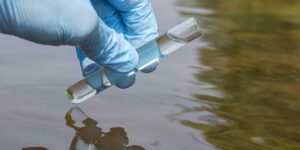Introduction
Water is indispensable to life, making the protection and management of our water resources a top priority. As human activities intensify, so does the risk of water pollution. Wastewater, originating from domestic, commercial, and industrial sources, often carries a cocktail of contaminants that require careful treatment before re-entering the environment or being reused. This is where wastewater testing services become vital. These services are essential for monitoring water quality, ensuring environmental safety, and protecting public health.
What is Wastewater Testing?
Wastewater testing involves the systematic analysis of water that has been altered by human use to identify and quantify pollutants. These pollutants can include:
1. Organic Matter
Resulting from food residues, human waste, and biological debris.
2. Chemical Compounds
Including pharmaceuticals, cleaning agents, and industrial chemicals.
3. Heavy Metals
Such as lead, mercury, cadmium, and arsenic.
4. Pathogens
Bacteria, viruses, and parasites that pose health risks.
5. Nutrients
Nitrogen and phosphorus compounds that can cause water bodies to become overly enriched, leading to eutrophication.
The Critical Role of Wastewater Testing
1. Environmental Conservation
Untreated or inadequately treated wastewater can devastate aquatic ecosystems. Testing identifies harmful substances that need to be removed to protect aquatic life and maintain ecological balance.
2. Public Health Protection
Contaminants in wastewater can have severe health implications. Regular testing helps prevent disease outbreaks and shields communities from exposure to dangerous substances.
3. Regulatory Adherence
Compliance with stringent environmental regulations is non-negotiable. Testing services help industries and municipalities meet these standards, avoiding legal repercussions and promoting sustainable operations.
4. Resource Optimization
In the era of sustainability, treated wastewater can be a valuable resource. Testing ensures that reclaimed water is safe for applications such as irrigation, industrial processes, and even drinking water in some cases.
Key Components of Wastewater Testing
1. Sampling
The process begins with the collection of representative wastewater samples. This can be done manually or through automated systems designed for periodic sampling.
2. Laboratory Analysis
Samples are scrutinized in laboratories equipped with advanced technology. Common analyses include:
Biochemical Oxygen Demand (BOD): Measures the amount of biodegradable organic matter.
Chemical Oxygen Demand (COD): Gauges the total amount of organic and inorganic substances.
Total Suspended Solids (TSS): Assesses the concentration of suspended particles.
Nutrient Analysis: Identifies levels of nitrogen, phosphorus, and other nutrients.
Microbiological Tests: Detects the presence of harmful pathogens.
3. Data Interpretation
Laboratory results are interpreted by experts to assess pollution levels and recommend treatment methods.
4. Reporting and Guidance
Comprehensive reports are generated, detailing the findings and providing recommendations for treatment and regulatory compliance.

Innovations in Wastewater Testing
Modern wastewater testing incorporates advanced technologies to enhance precision and efficiency. These innovations include:
1. Spectroscopy and Chromatography: For detailed chemical composition analysis.
2. Molecular Techniques: Such as polymerase chain reaction (PCR) for pathogen detection.
3. Automated Sensors and Real-Time Monitoring: For continuous water quality assessment.
Selecting a Wastewater Testing Service
When choosing a wastewater testing service, consider these factors:
1. Accreditation: Ensure the laboratory is accredited by recognized authorities, indicating adherence to high standards.
2. Experience and Expertise: Look for a service with a proven track record and knowledgeable professionals.
3. Comprehensive Testing Capabilities: The service should offer a broad range of tests to cover all potential contaminants.
4. Timeliness and Reliability: Prompt and accurate results are critical for effective management and compliance.
Conclusion
Wastewater testing services are indispensable for environmental protection, public health, and sustainable water management. As human activities continue to impact water resources, the importance of precise and reliable wastewater testing grows. By investing in these services, industries, municipalities, and communities can help ensure a cleaner, safer, and more sustainable future for all.
This blog provides an in-depth look at the crucial role of wastewater testing services in safeguarding our water resources. It underscores the significance of accurate testing and the need for cutting-edge technologies to enhance wastewater management strategies.
For wastewater monitoring-related enquiries, please contact us www.mahabal.com
How to get started
If you would like to get wastewater testing and analysis services done, write to us at enquiry.meepl@gmail.com or contact us
